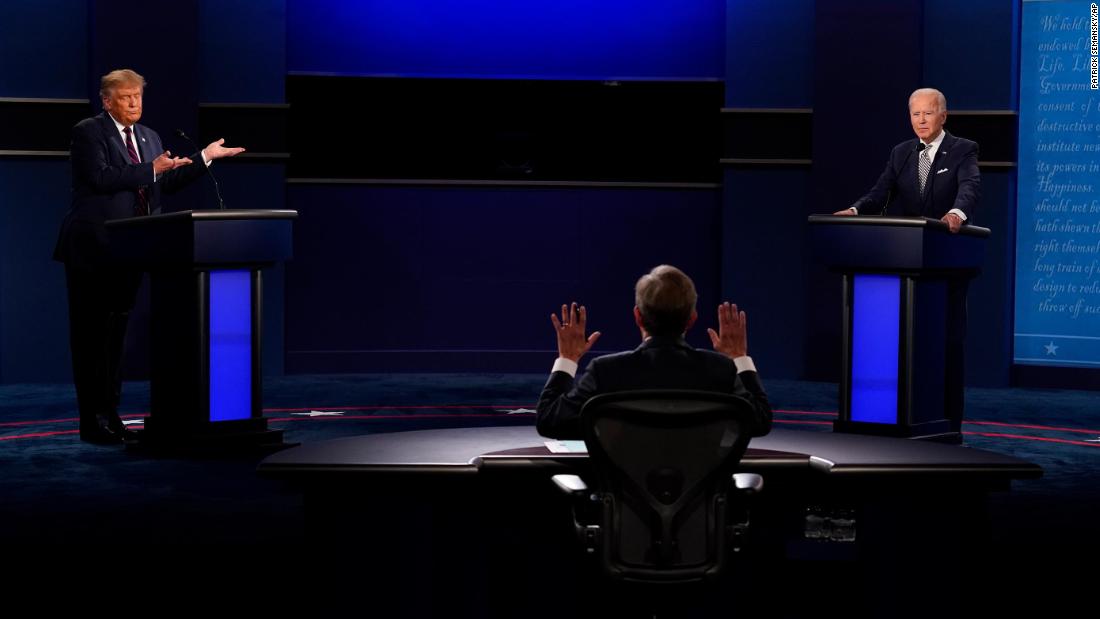
Tuesday's basic format -- two-minute answers, with opportunities for rebuttal -- wasn't the reason the debate got so ugly. The fatal flaw was not giving the moderator, Chris Wallace, the power to compel the candidates to follow the rules they'd agreed to.
The only way to keep out-of-control debaters in line is to give the moderator the ability to turn off the candidates' microphones -- and the authority, if necessary, to eject them from the debate altogether.
That might sound extreme, but I've learned the hard way that extreme measures are occasionally necessary. And they work.
Over the years, I have been a moderator or questioner for more than 100 political debates at every level of government. That includes obscure local city council and state legislative primaries, campaigns for prosecutorial offices, and hotly contested races for the US House and Senate. I have been part of at least one televised debate in every race for New York City mayor since 2005 (including the unforgettable year of 2013, when I moderated no fewer than 13 mayoral debates in venues all over the city). I also was a panelist at the CNN-sponsored final debate between Hillary Clinton and Bernie Sanders in 2016, a 2-hour slugfest in Brooklyn.
Making sure that a debate is simultaneously lively, civil and informative requires a great deal of work, especially when candidates are determined to break the agreed-upon format. The rule-breaking is nearly always a deliberate attempt to knock an opponent off stride, usually by interrupting them or slipping in an insult, accusation or falsehood -- often, all three at the same time.
When that happens, the moderator has to step in and restore order immediately, or risk watching the debate devolve into chaos.
When a candidate gets cheated out of time by a long-winded opponent, the moderator must have the power to reset the clock. If a candidate starts interrupting or overtalking their opponent, the moderator has to make them stop.
And you have to be ready to take action when the first violation happens.
In 2018, during a debate for New York State comptroller, one candidate pulled a document out of his breast pocket, purportedly to prove that his opponent had approved hush-money public payments to settle sexual abuse cases. It was a cheap stunt and a violation of debate rules.
I stopped the debate.
"Let's bring all of this to a halt," I said, addressing the offender directly as the cameras rolled. "If you want to end the debate, you can go home tonight. Is that what you want to do?" I asked. "Put that crap away. We said no props and you agreed to it."
It was heavy-handed, but that is what the situation called for. He put the papers back in his jacket pocket, and we continued on with a debate that ultimately turned out to be informative and even pleasant.
The same couldn't be said about the raucous, out-of-control general election debate for New York mayor in 2017. One candidate, Bo Dietl, insisted on yelling, talking out of turn and shouting personal insults and other foolishness during the debate. We ended up cutting off his mic.
That same debate, held in a theater in Manhattan, included a handful of noisy audience members who kept shouting out insults at candidates. After a couple of warnings, I signaled to security and had one of the disrupters escorted out of the auditorium, which quieted down the rest of the crowd.
Don't get me wrong: a spirited, free-form debate between candidates can happen without a lot of moderator involvement.
In 2013, former New York Gov. Eliot Spitzer ran for city comptroller against a less well-known candidate, Scott Stringer, in what became a bitterly contentious Democratic primary. A few minutes into the debate, Spitzer and Stringer -- more or less unprompted -- began a series of bitter back-and-forth accusations of ethical and policy lapses. I and my co-moderator -- veteran public radio host Brian Lehrer -- silently let the two men go back and forth for about five minutes.
There was no need to intervene because the issues were substantive and both candidates, although furious, each allowed their rival to answer. It was a rare example of an important truth: debate rules are guidelines to facilitate a good, substantive exchange. If a good discussion breaks out, the job of the moderator is to sit back and let it happen.
But that was an exception. In the age of Trump, presidential debates have to be ready for candidates who have deep contempt for the format, their opponent and, ultimately, the public. In such cases, aspiring to be "invisible," as Chris Wallace said he'd hoped to be, is a formula for disaster. A skilled moderator can transform even a rowdy debate from must-flee to must-see. But only if the commission gives them the power to do so.
"Opinion" - Google News
October 01, 2020 at 10:08AM
https://ift.tt/34cC4ka
There's only one way to fix the presidential debates - CNN
"Opinion" - Google News
https://ift.tt/2FkSo6m
Shoes Man Tutorial
Pos News Update
Meme Update
Korean Entertainment News
Japan News Update
No comments:
Post a Comment